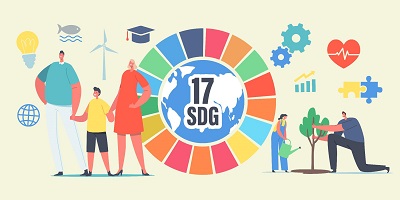Introduction
Revitalizing Africa's Sustainable Development Goals (SDGs) requires substantial resources, and the current global financial order is proving inadequate. The African Union (AU) must intensify efforts and form partnerships with Global South countries to address this challenge. Africa, after two decades of economic progress, now faces significant hurdles, including debt and food insecurity, exacerbated by the COVID-19 pandemic and the Ukraine-Russia conflict. The AU's leadership in financial reforms is crucial to realigning Africa's SDGs.
Historical Context and Current Challenges
From 2000 to 2010, Sub-Saharan Africa experienced robust economic growth, averaging 5 percent annually, and significant developmental strides were made. Poverty rates declined from 56 percent in 2000 to 42.1 percent in 2010. However, the COVID-19 pandemic dealt a severe blow to this progress, and the subsequent Ukraine-Russia war precipitated a massive food crisis across the continent. Currently, the region is grappling with a severe debt crisis, with more than half of Africa’s low-income countries in debt distress. Ghana, Zambia, Mali, and Ethiopia have already defaulted. In 2021, approximately 39 million Africans fell into extreme poverty, and millions are facing acute food insecurity, with nearly 33 African countries requiring external food assistance.
Africa’s progress on SDGs remains slow and uneven. Without accelerated action and a substantial inflow of funds, achieving the SDGs will be an elusive goal. Finance has been a significant barrier to the SDG implementation since their adoption in 2015. The 2030 Agenda emphasized the strengthening of domestic resource mobilization and the harnessing of private sector funds, alongside meeting aid commitments and innovative financing instruments. However, mobilizing domestic resources through taxation is particularly challenging for most developing countries in Africa.
Financial Barriers to SDG Implementation
According to United Nations estimates, Africa faces a daunting SDG financing gap of about US$ 200 billion per year. Rising debt burdens, high borrowing costs, and limited fiscal space further exacerbate this challenge. By 2023, the public debt to GDP ratio peaked at 60 percent, and the average Sub-Saharan African country was allocating about 12 percent of its revenues to interest payments, significantly compromising development spending. Global crises have disproportionately affected Africa’s investment climate. Post-pandemic, Africa's share in global greenfield Foreign Direct Investment (FDI) dropped to its lowest in 17 years at 6 percent, while high-income countries saw their highest-ever share at 61 percent. The high cost of capital in Africa hampers investments in crucial sectors such as renewable energy.
Traditional economic sources, such as official development assistance (ODA), have also become scarcer. Despite record ODA levels following the pandemic, there was a 2 percent decline in aid flows to developing countries due to resource diversion to hosting refugees in donor countries after the Ukraine-Russia war. For Africa, the decline was even more pronounced at 3.5 percent. Developed countries have also failed to meet their pledge of providing US$ 100 billion in climate finance annually by 2020, as agreed upon in the Copenhagen Climate Summit. Without significant external support, the SDG agenda is at risk, and Africa may face another 'lost decade'.
Need for Systemic Financial Reforms
While ODA remains crucial, it alone will not suffice. Mobilizing resources to finance SDGs in Africa necessitates deeper systemic reforms in the international financial architecture, which is outdated and fails to serve Africa’s interests. The pandemic highlighted the disparity between the North and the South, with the developed North able to provide massive economic stimulus and receiving the bulk of the Special Drawing Rights (SDRs) from the International Monetary Fund (IMF). African countries, by contrast, lacked fiscal space, and the median stimulus package for the region was only 1.5 percent of GDP. African nations received only 3 percent of the IMF's SDRs.
Calls for reforming the international financial order are growing louder as it becomes evident that Africa is underrepresented in international financial institutions. Inherent biases in debt contracts, economic conditionalities, credit ratings, SDR allocation, tax norms, and limited representation and voting rights in international bodies hinder Africa’s economic progress. The admission of the African Union (AU) as a permanent member of the G20 was symbolically significant, providing representation to a continent historically marginalized in global platforms. However, Africa must leverage this opportunity to push for financial reforms and advocate for economic justice and equal partnership rather than being a mere rule-taker.
AU's Strategic Priorities and Initiatives
At the AU Summit in February 2024, Africa outlined several priorities for a global financial order that serves its interests. These include resolving the debt crisis, securing more grant and concessional funds, re-channeling SDRs to African financial institutions, increasing African voice and decision-making power in global bodies, and committing to a green-growth industrialization agenda. Furthermore, African Multilateral Financial Institutions (AFMIs), such as the African Export-Import Bank and African Finance Corporation, have formed the 'Africa Club' or Alliance of African Multilateral Financial Institutions to enhance collaboration and address Africa’s financing challenges.
The AU’s initiatives are crucial, but forging partnerships with Global South countries is equally important. The AU’s entry into the G20 is timely, coinciding with India, Brazil, and South Africa setting the agenda for the G20. India, in particular, has been a strong ally, advocating for AU’s permanent G20 membership and representing the Global South’s voice. Close partnerships with these countries will bolster Africa’s position and help drive systemic financial reforms.
Conclusion
In conclusion, substantial resources are required to prevent another 'lost decade' for Africa and realign the continent’s SDGs. The current global financial order is inadequate, necessitating deep systemic reforms. The AU must take a proactive role in advocating for these reforms and forge close partnerships with countries in the Global South to advance its agenda. The future of Africa’s development hinges on the successful mobilization of resources and the establishment of a more equitable international financial system.
|
Probable Questions for UPSC Mains Exam
|
Source – ORF







